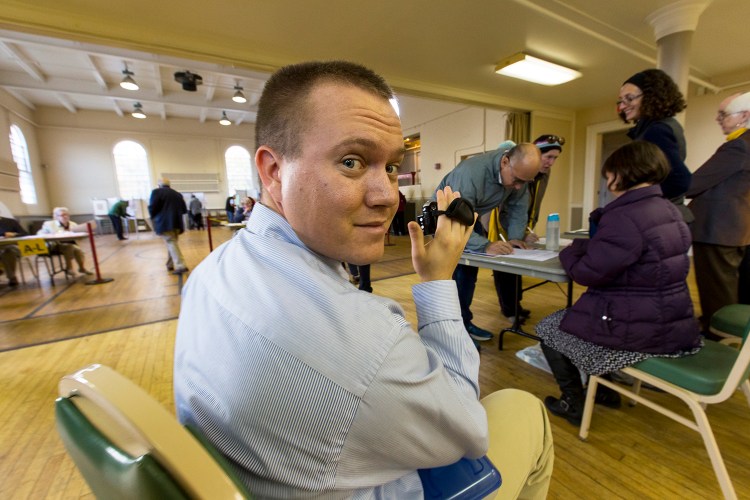AUGUSTA — A proposal designed to ensure that video recording at polling places doesn’t intimidate voters is among about 50 bills that could be considered when a panel of legislative leaders meets Thursday.
The Legislative Council will vote to determine if any of the bills will advance to the second regular session when the Legislature convenes in January. The poll recording bill was motivated by complaints that gun rights activists were intimidating voters when they gathered at several southern Maine polling places on Election Day to film the signature gathering effort by gun control activists hoping to advance a referendum next year. The proposal by Sen. Bill Diamond, D-Windham, is one of 26 bills that have been submitted after the Sept. 25 deadline. Others include a proposal to allow towns to prohibit firearms on municipal property, a bill to improve college graduation rates and a bill to encourage roller derby.
The council could also vote on whether to include 20 other bills that were tabled at meetings in October and November. Those proposals include efforts designed to provide accountability in the state’s welfare system; improve job opportunities for welfare recipients; and alter the state’s criminal code to prevent “improper influence” by an elected official.
The improper influence bill, submitted by Democratic House leader Rep. Jeff McCabe, D-Skowhegan, was prompted by Gov. Paul LePage’s controversial intervention in a private school’s decision to hire House Speaker Mark Eves, D-North Berwick.
So far the council has allowed more than 80 new bills for in the next session. It is not required to act on the previously tabled bills and could vote to table the after-deadline requests. The Legislature will also deal with more than 150 bills that were carried over from the first regular session. The governor can submit bills at any time during the session.
Diamond, a former secretary of state, said his poll video recording bill wouldn’t prohibit recording but attempts to ensure that recording of signature gathering — a public process — doesn’t infringe on the private act of voting. He said he consulted with Secretary of State Matt Dunlap when drafting his bill.
Diamond said they both believe the recording that occurred on Election Day was a “serious problem,” but it couldn’t be solved by creating no-video zones around polling booths because polling places vary significantly. Instead, Diamond is proposing to give election wardens clear authority to ask those who are making videos to move away from ballot boxes if voters complain.
“One of the things we found out from the places that this happened is that the wardens didn’t feel like they could do anything about it,” Diamond said. “So if it becomes a conflict, or it starts to disrupt the polling place, or people complain, then the warden can step in and make some decisions. And if needed, they could have the videographer removed.”
In order to be accepted in the second session, bill must receive a majority vote from the Legislative Council, which is split between five Democratic and five Republican leaders. Many bills have been rejected on party lines, but Diamond believes he has at least one Republican who is willing to advance his proposal to the next session.
Topsham Republican Sen. Linda Baker’s request to allow towns to prohibit firearms on municipal property faces a different challenge because it will likely require a Republican members’ support. Baker told Maine Public Broadcasting Network that the proposal was submitted at the request of town officials in her district who are worried that people will bring firearms to meetings. She said the concern had heightened since a new state law went into effect that allows anyone to carry a concealed handgun without a permit.
Other after-deadline proposals include a bill by Sen. James Dill, D-Old Town, to provide assistance to laid off workers. Dill’s bill was submitted after the Old Town pulp mill announced it was closing, laying off 195 workers.
The state’s drug epidemic is the focus of several bills that will be aired next session. The drug measures include legislative leaders’ $4.8 million bill to add 10 agents to the Maine Drug Enforcement Agency and bolster treatment and prevention, as well as several other proposals that provide additional treatment services for addicts, increasing drug education in public schools, increasing fines for interstate drug trafficking convictions and increasing state reimbursement rates to treatment centers.
Details of the after-deadline bills, as well as the tabled proposals, won’t be available until the bills are drafted and referred to a legislative committee.
Copy the Story LinkSend questions/comments to the editors.



Success. Please wait for the page to reload. If the page does not reload within 5 seconds, please refresh the page.
Enter your email and password to access comments.
Hi, to comment on stories you must . This profile is in addition to your subscription and website login.
Already have a commenting profile? .
Invalid username/password.
Please check your email to confirm and complete your registration.
Only subscribers are eligible to post comments. Please subscribe or login first for digital access. Here’s why.
Use the form below to reset your password. When you've submitted your account email, we will send an email with a reset code.